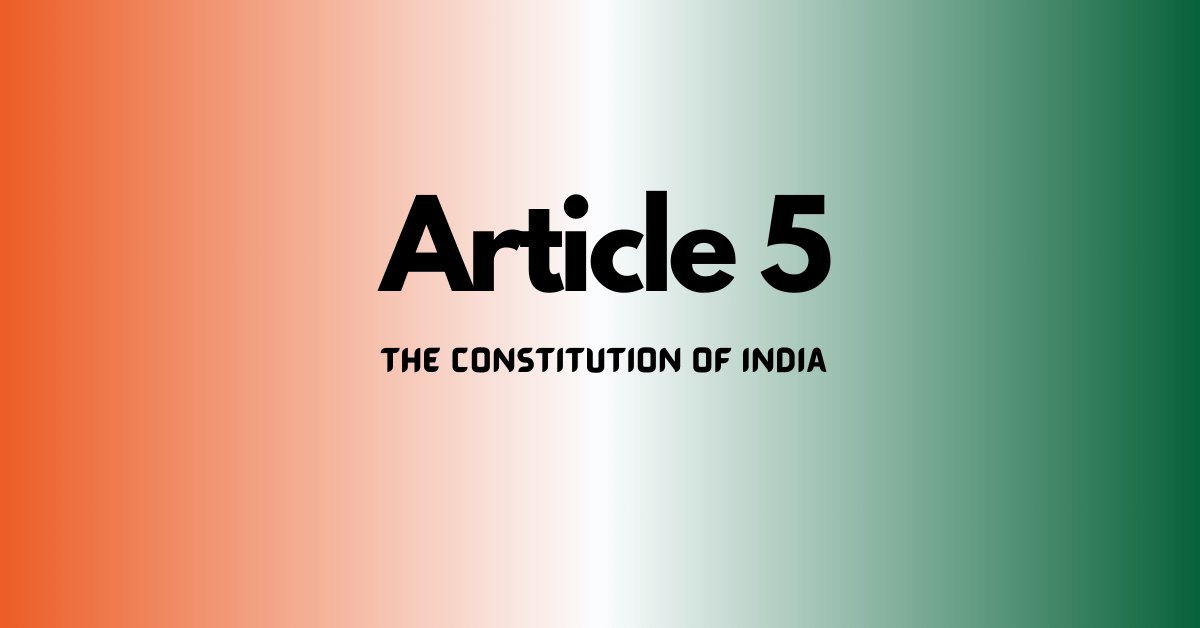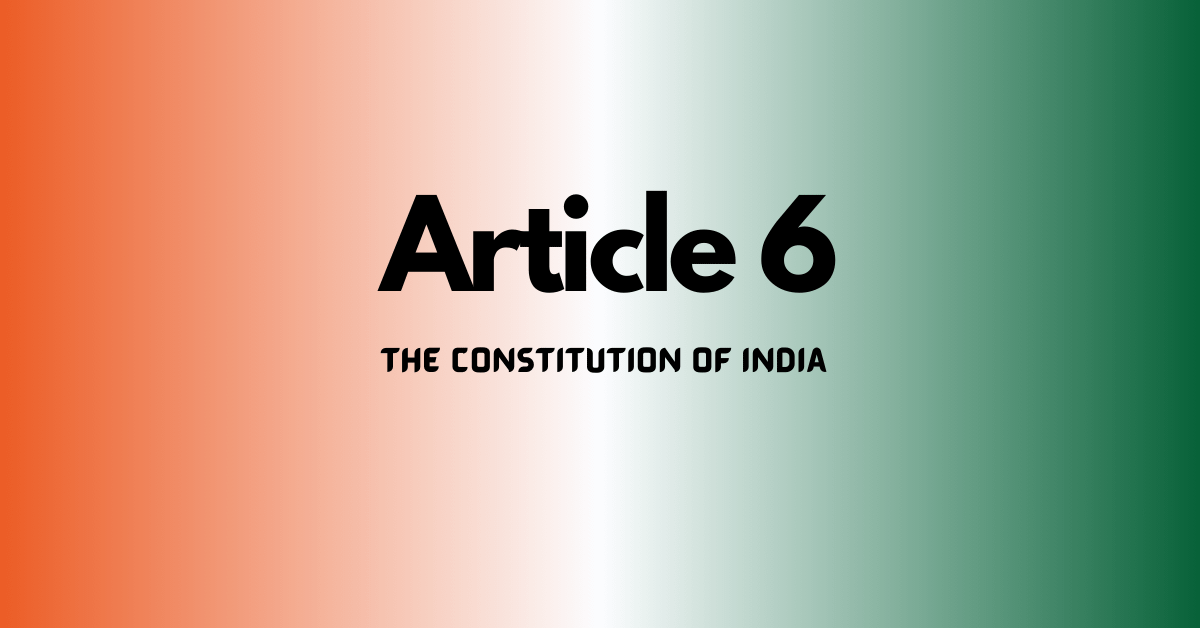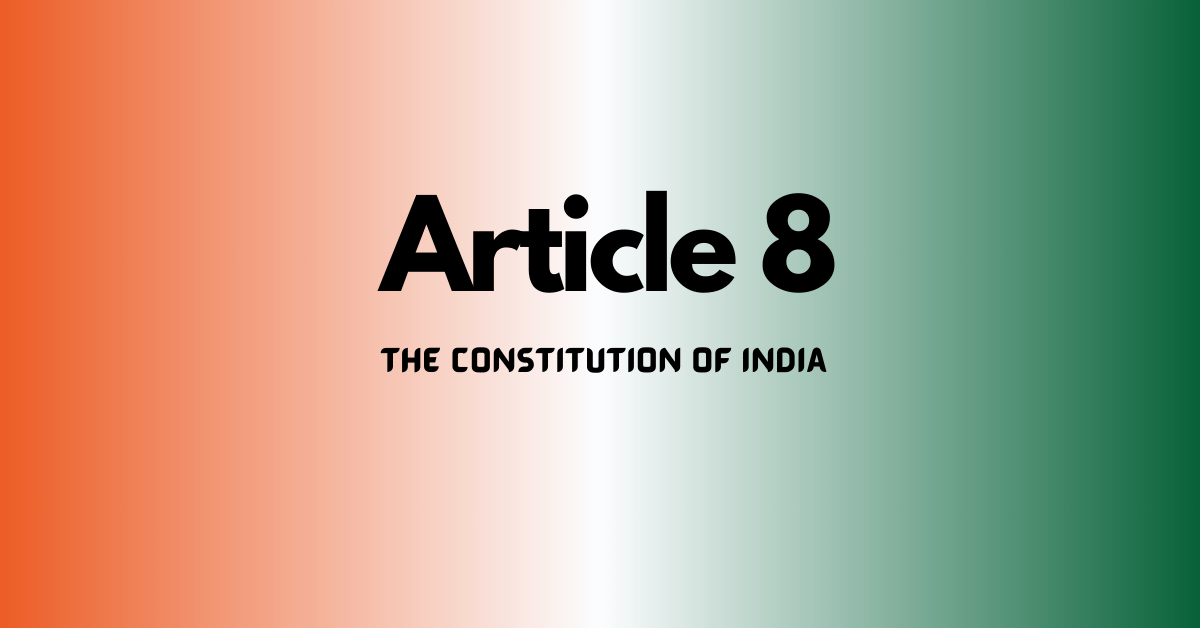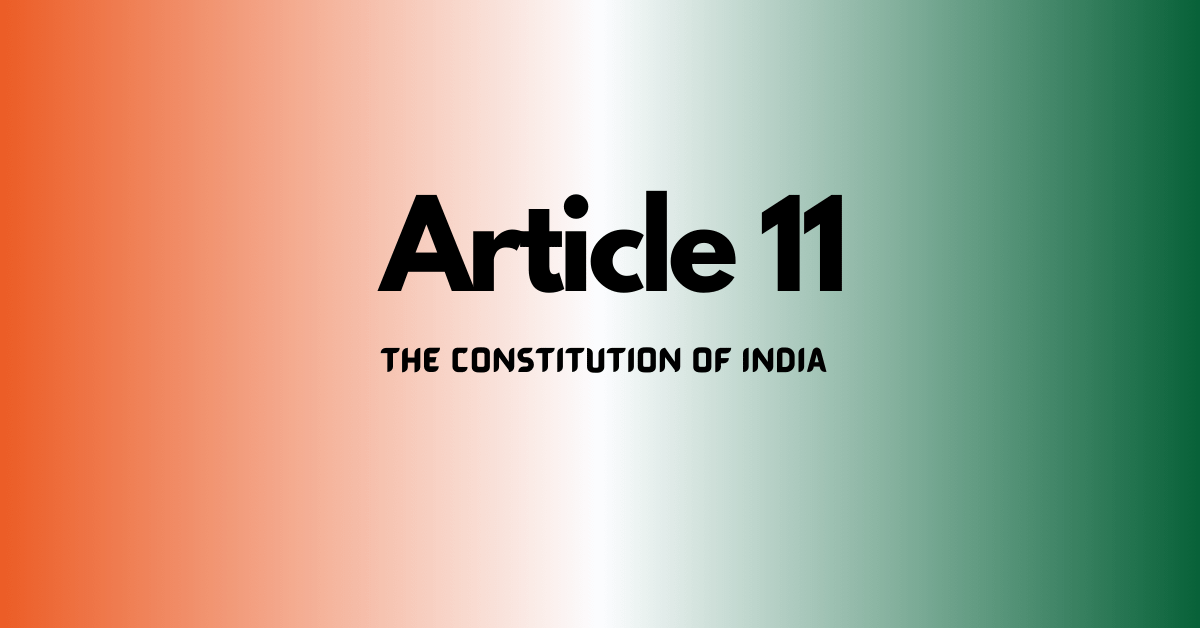Article 5:

Article 5 of The Constitution of India (Original Text):
Citizenship at the commencement of the Constitution.—
At the commencement of this Constitution, every person who has his domicile in the
territory of India and—
(a) who was born in the territory of India; or
(b) either of whose parents was born in the territory of India; or
(c) who has been ordinarily resident in the territory of India for not less than five years immediately preceding such commencement, shall be a citizen of India.
Explanation-Article 5 of The Constitution of India:
This article specifies the qualifications for citizenship at the commencement of the Constitution, based on domicile, birth, or residency in the territory of India.
Citizenship at Commencement of the Constitution
- Qualification Criteria:
- Every person who, at the commencement of this Constitution, meets the following criteria shall be a citizen of India:
- Having domicile in the territory of India.
- Falling under one of the following categories:
- Born in the territory of India.
- Having at least one parent born in the territory of India.
- Having been ordinarily resident in the territory of India for at least five years immediately preceding such commencement.
- Every person who, at the commencement of this Constitution, meets the following criteria shall be a citizen of India:
Article 6:

Article 6 of The Constitution of India (Original Text):
Rights of citizenship of certain persons who have migrated to India from Pakistan-
- Notwithstanding anything in article 5, a person who has migrated to the territory of India from the territory now included in Pakistan shall be deemed to be a citizen of India at the commencement of this Constitution if-
- (a) he or either of his parents or any of his grand-parents was born in India as defined in the Government of India Act, 1935 (as originally enacted); and
- (b)(i) in the case where such person has so migrated before the nineteenth day of July, 1948, he has been ordinarily resident in the territory of India since the date of his migration, or
- (ii) in the case where such person has so migrated on or after the nineteenth day of July, 1948, he has been registered as a citizen of India by an officer appointed in that behalf by the Government of the Dominion of India on an application made by him therefor to such officer before the commencement of this Constitution in the form and manner prescribed by that Government:
Provided that no person shall be so registered unless he has been resident in the territory of India for at least six months immediately preceding the date of his application.
Explanation-Article 6 of The Constitution of India:
This article outlines the citizenship rights for persons migrating from Pakistan to India, specifying the conditions that must be met for them to be considered citizens of India at the commencement of the Constitution.
Citizenship Rights for Persons Migrating from Pakistan
- Scope of Provision:
- Despite the provisions of Article 5, a person migrating to India from the territory now included in Pakistan shall be considered a citizen of India at the commencement of this Constitution if certain conditions are met.
- Qualification Criteria:
- The person or their parents/grandparents must have been born in India as defined in the Government of India Act, 1935.
- Additionally, the following conditions apply:
- If the migration occurred before July 19, 1948, the person must have been ordinarily resident in the territory of India since the date of migration.
- If the migration occurred on or after July 19, 1948, the person must have been registered as a citizen of India by an officer appointed by the Government of the Dominion of India. This registration should have been done before the commencement of this Constitution and in accordance with the prescribed form and manner.
- Furthermore, the person must have been resident in the territory of India for at least six months immediately preceding the date of their application for registration.
Article 7:

Article 7 of The Constitution of India (Original Text):
Rights of citizenship of certain migrants to Pakistan.—
Notwithstanding anything in articles 5 and 6, a person who has after the first day of March, 1947, migrated from the territory of India to the territory now included in Pakistan shall not be deemed to be a citizen of India:
Provided that nothing in this article shall apply to a person who, after having so migrated to the territory now included in Pakistan, has returned to the territory of India under a permit for resettlement or permanent return issued by or under the authority of any law and every such person shall for the purposes of clause (b) of article 6 be deemed to have migrated to the territory of India after the nineteenth day of July, 1948.
Explanation-Article 7 of The Constitution of India:
This article clarifies the citizenship rights for individuals who migrated from India to Pakistan after a certain date, with an exception for those who have returned to India under specific permits for resettlement or permanent return.
Rights of Citizenship for Migrants to Pakistan
- Scope of Provision:
- Exception:
- This provision does not apply to individuals who, after migrating to the territory now included in Pakistan, have returned to the territory of India under a permit for resettlement or permanent return issued by or under the authority of any law.
- Such individuals shall be considered to have migrated to the territory of India after July 19, 1948, for the purposes of Article 6(b).
- This provision does not apply to individuals who, after migrating to the territory now included in Pakistan, have returned to the territory of India under a permit for resettlement or permanent return issued by or under the authority of any law.
Article 8:

Article 8 of The Constitution of India (Original Text):
Rights of citizenship of certain persons of Indian origin residing outside India-
Notwithstanding anything in article 5, any person who or either of whose parents or any of whose grand-parents was born in India as defined in the Government of India Act, 1935 (as originally enacted), and who is ordinarily residing in any country outside India as so defined shall be deemed to be a citizen of India if he has been registered as a citizen of India by the diplomatic or consular representative of India in the country where he is for the time being residing on an application made by him therefor to such diplomatic or consular representative, whether before or after the commencement of this Constitution, in the form and manner prescribed by the Government of the Dominion of India or the Government of India.
Explanation-Article 8 of The Constitution of India:
This article outlines the citizenship rights for persons of Indian origin residing outside India, specifying the conditions under which they may be deemed citizens of India.
Citizenship Rights for Persons of Indian Origin Residing Outside India
- Scope of Provision:
- Despite the provisions of Article 5, any person who, or either of whose parents or any of whose grandparents, was born in India as defined in the Government of India Act, 1935, and who is ordinarily residing in any country outside India as so defined, shall be deemed to be a citizen of India under certain conditions.
- Qualification Criteria:
- The person must meet the following criteria:
- Born in India as defined in the Government of India Act, 1935.
- Ordinarily residing in any country outside India.
- Additionally, the following conditions apply:
- The person must have been registered as a citizen of India by the diplomatic or consular representative of India in the country where they are residing at the time of application.
- The application for registration may be made either before or after the commencement of this Constitution and must be submitted in the form and manner prescribed by the Government of the Dominion of India or the Government of India.
- The person must meet the following criteria:
Article 9 :

Article 9 of The Constitution of India (Original Text):
Persons voluntarily acquiring citizenship of a foreign State not to be citizens.— No person shall be a citizen of India by virtue of article 5, or be deemed to be a citizen of India by virtue of article 6 or article 8, if he has voluntarily acquired the citizenship of any foreign State.
Explanation-Article 9 of The Constitution of India:
This article clarifies that individuals who voluntarily acquire citizenship of a foreign State shall not be considered citizens of India under the specified articles.
Citizenship Implications for Those Acquiring Foreign Citizenship
- Scope of Provision:
- No person shall be considered a citizen of India under Article 5, nor deemed to be a citizen of India under Articles 6 or 8, if they have voluntarily acquired the citizenship of any foreign State.
Article 10:

Article 10 of The Constitution of India (Original Text):
Continuance of the rights of citizenship.—
Every person who is or is deemed to be a citizen of India under any of the foregoing provisions of this
Part shall, subject to the provisions of any law that may be made by Parliament, continue to be such citizen.
Explanation-Article 10 of The Constitution of India:
This article ensures that individuals who are citizens of India under the preceding provisions of the Constitution shall continue to retain their citizenship rights, subject to any laws enacted by Parliament.
Continuation of Citizenship Rights
- Scope of Provision:
- Every person who is or is deemed to be a citizen of India under any of the preceding provisions of this Part shall continue to be such a citizen, subject to any laws made by Parliament.
Article 11:

Article 11 of The Constitution of India (Original Text):
Parliament to regulate the right of citizenship by law.—
Nothing in the foregoing provisions of this Part shall derogate from the power of Parliament to make any provision with respect to the acquisition and termination of citizenship and all other matters relating to citizenship.
Explanation-Article 11 of The Constitution of India:
This article affirms Parliament’s authority to enact legislation pertaining to citizenship, including its acquisition, termination, and other related matters, without being restricted by the provisions of this Part of the Constitution.
Regulation of Citizenship Rights by Parliament
- Scope of Provision:
- The provisions outlined in this Part of the Constitution shall not limit the authority of Parliament to enact laws regarding the acquisition, termination, and all other aspects of citizenship.
IF YOU HAVE ANY DOUBTS , USE THE COMMENT SECTION FREELY.
For Article-Wise quiz & Part-Wise Quiz Join Telegram , Test Yourself For Better Results!
